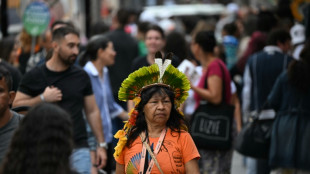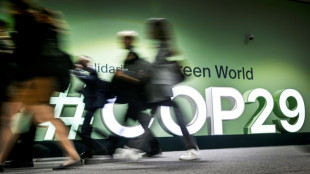
-
 India go on record six-hitting spree against South Africa
India go on record six-hitting spree against South Africa
-
France skipper Dupont says All Blacks 'back to their best'

-
 Trump pressures US Senate with divisive cabinet picks
Trump pressures US Senate with divisive cabinet picks
-
Bagnaia strikes late in Barcelona practice to edge title rival Martin

-
 High-ball hero Steward ready to 'front up' against South Africa
High-ball hero Steward ready to 'front up' against South Africa
-
Leader of Spain flood region admits 'mistakes'

-
 Swiatek, Linette take Poland past Spain into BJK Cup quarter-finals
Swiatek, Linette take Poland past Spain into BJK Cup quarter-finals
-
Leftist voices seek to be heard at Rio's G20 summit

-
 Wales coach Jenkins urges players to 'get back on the horse'
Wales coach Jenkins urges players to 'get back on the horse'
-
Zverev reaches ATP Finals last four, Alcaraz out

-
 Boeing strike will hurt Ethiopian Airlines growth: CEO
Boeing strike will hurt Ethiopian Airlines growth: CEO
-
Springboks skipper Kolisi wary of England's 'gifted' Smith

-
 End of a love affair: news media quit X over 'disinformation'
End of a love affair: news media quit X over 'disinformation'
-
US finalizes up to $6.6 bn funding for chip giant TSMC

-
 Scholz urges Ukraine talks in first call with Putin since 2022
Scholz urges Ukraine talks in first call with Putin since 2022
-
Zverev reaches ATP Finals last four, Alcaraz on brink of exit

-
 Lebanon rescuer picks up 'pieces' of father after Israel strike
Lebanon rescuer picks up 'pieces' of father after Israel strike
-
US retail sales lose steam in October after hurricanes

-
 Zverev reaches ATP Finals last four with set win against Alcaraz
Zverev reaches ATP Finals last four with set win against Alcaraz
-
Kerevi back for Australia against Wales, Suaalii on bench

-
 Spate of child poisoning deaths sparks S.Africa xenophobia
Spate of child poisoning deaths sparks S.Africa xenophobia
-
Comedian Conan O'Brien to host Oscars

-
 Rozner overtakes McIlroy and Hatton for Dubai lead
Rozner overtakes McIlroy and Hatton for Dubai lead
-
Mourners bid farewell to medic killed in east Ukraine

-
 Gore says 'absurd' to hold UN climate talks in petrostates
Gore says 'absurd' to hold UN climate talks in petrostates
-
Hamas says 'ready for ceasefire' as Israel presses Gaza campaign

-
 Amorim says Man Utd is 'where I'm supposed to be'
Amorim says Man Utd is 'where I'm supposed to be'
-
Japan hammer Indonesia to edge closer to World Cup spot

-
 Jeff Beck guitar collection to go under the hammer in January
Jeff Beck guitar collection to go under the hammer in January
-
Veteran Ranieri has 'no time for mistakes' on Roma return

-
 Van Nistelrooy says he will 'cherish' Man Utd memories in farewell message
Van Nistelrooy says he will 'cherish' Man Utd memories in farewell message
-
IAEA chief tours sensitive Iran nuclear plants

-
 Pompeii rejects 'mass tourism' with daily visitor limit
Pompeii rejects 'mass tourism' with daily visitor limit
-
Jailed Russian poet could be 'killed' in prison, warns wife

-
 French court orders release of Lebanese militant held since 1984
French court orders release of Lebanese militant held since 1984
-
Global stocks struggle after Fed signals slower rate cuts

-
 UK economy slows, hitting government growth plans
UK economy slows, hitting government growth plans
-
Primary schools empty as smog persists in Indian capital

-
 Palestinians turn to local soda in boycott of Israel-linked goods
Palestinians turn to local soda in boycott of Israel-linked goods
-
Typhoon Man-yi bears down on Philippines still reeling from Usagi

-
 UK growth slows in third quarter, dealing blow to Labour government
UK growth slows in third quarter, dealing blow to Labour government
-
Chris Wood hits quickfire double in NZ World Cup qualifying romp

-
 Markets struggle at end of tough week
Markets struggle at end of tough week
-
China tests building Moon base with lunar soil bricks

-
 Film's 'search for Palestine' takes centre stage at Cairo festival
Film's 'search for Palestine' takes centre stage at Cairo festival
-
Oil execs work COP29 as NGOs slam lobbyist presence

-
 Gore says climate progress 'won't slow much' because of Trump
Gore says climate progress 'won't slow much' because of Trump
-
'Megaquake' warning hits Japan's growth

-
 Stiff business: Berlin startup will freeze your corpse for monthly fee
Stiff business: Berlin startup will freeze your corpse for monthly fee
-
Wars, looming Trump reign set to dominate G20 summit

| RBGPF | 2.67% | 61.84 | $ | |
| CMSC | 0.18% | 24.595 | $ | |
| BCC | -0.33% | 139.89 | $ | |
| BP | -0.48% | 28.91 | $ | |
| RIO | 0.73% | 60.875 | $ | |
| NGG | 0.31% | 62.565 | $ | |
| RYCEF | 0.44% | 6.82 | $ | |
| GSK | -2.15% | 33.2852 | $ | |
| SCS | 0.23% | 13.3 | $ | |
| BTI | 2.2% | 36.29 | $ | |
| JRI | -0.36% | 13.03 | $ | |
| CMSD | -0.03% | 24.35 | $ | |
| VOD | 0.69% | 8.74 | $ | |
| BCE | -0.26% | 26.77 | $ | |
| RELX | -3.27% | 44.495 | $ | |
| AZN | -2.33% | 63.56 | $ |

Climate change primary driver of amphibian decline: study
Climate change has become the main factor driving amphibians towards extinction as they remained the most threatened vertebrates over the past two decades, according to research published on Wednesday.
Frogs, toads, newts, salamanders and other cold-blooded creatures living in moist settings are acutely vulnerable to changes in their environment.
As they breathe through their skin and have no feathers, hair or scales for protection, extreme heat linked to climate change means they dehydrate quickly and lose breeding sites that need moisture.
More frequent, intense and longer storms, floods and higher sea levels can destroy their forest habitats and breeding grounds.
"In many cases these changes are happening too quickly for them to adapt," said Kelsey Neam, of the Amphibian Specialist Group at the International Union for Conservation of Nature's (IUCN) Species Survival Commission.
"Climate change is an underestimated threat to amphibians" and will become "more evident" as more data emerges going forward, she added, predicting "an exponential effect".
"We expect climate change to push species closer to extinction," Neam told AFP.
A landmark 2004 study, the Global Amphibian Assessment, showed amphibians were the world's most threatened vertebrates.
In a paper published in the journal Nature on Wednesday, researchers built on a second such study published last year that evaluated 8,011 species for the IUCN Red List.
They found almost 41 percent of amphibians were globally threatened, defined as appearing under the list's "critically endangered", "endangered" and "vulnerable" categories.
That represented a deterioration from 37.9 percent in 1980 and 39.4 percent in 2004.
Climate change was the main driver of 39 percent of status declines from 2004 to 2022, affecting 119 species, with habitat loss and degradation at 37 percent.
Climate change can also exacerbate other threats such as fires, disease and land use change, the authors noted.
Habitat loss and damage linked to agriculture, infrastructure development and other industries remained the most common threat but did not primarily drive as many status deteriorations.
In contrast, habitat loss and disease -- especially the chytrid fungus, which devastated amphibians worldwide starting in the late 1990s -- were responsible for 91 percent of status deteriorations between 1980 and 2004, with just one percent primarily due to climate change.
- 'Investment in our planet' -
Threatened species were concentrated most in Caribbean islands, Mesoamerica, the tropical Andes, Cameroon, Nigeria, Madagascar, India's Western Ghats mountain range and Sri Lanka.
Salamanders and newts were the most affected species.
For example, five US salamander species have experienced status declines due to fires and less humid soils caused by droughts and wildfires that scientists say climate change has exacerbated.
In parts of Australia and Brazil, reduced rainfall linked to climate change is predicted to threaten the reproduction of frogs that depend on high levels of moisture in the soil and fallen leaves to prevent their eggs drying up.
The authors called for greater investment and policy responses to support amphibians, which play a key role in ecosystems and can help fight climate change.
They are prey for mammals, birds and reptiles, contribute to recycling nutrients and help sustain the food web, which would collapse without them, said Neam, who highlighted the urgency of protecting habitats and slashing carbon emissions.
"By protecting amphibians, we are protecting the forests and ecosystems that are key, nature-based solutions to battling climate change," she told AFP.
"An investment in amphibians is an investment in the future of our planet."
Amphibians' small distribution often makes them more vulnerable to extinction than other vertebrates, but that can also facilitate conservation efforts, said study co-author Jennifer Luedtke, of the IUCN's Amphibian Specialist Group.
Improved habitat protection and management played major roles in species who improved their category between 2004 and 2022, Neam added.
J.Fankhauser--BTB
